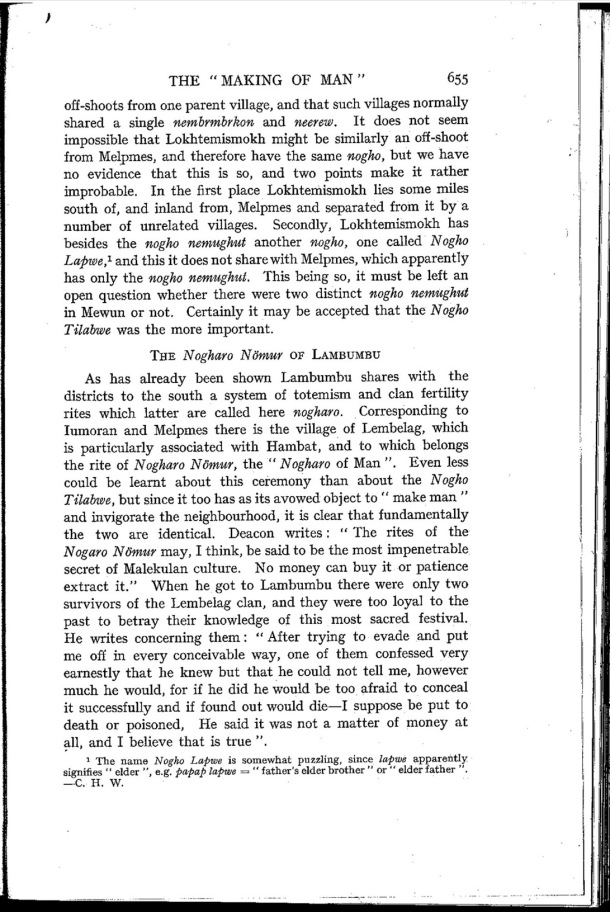|
|  [Note: this transcription was produced by an automatic OCR engine]
THE “MAKING or MAN " 655
off-shoots from one parent village, and that such villages normally
shared a single nembrmbrkon and mum. It does not seem
impossible that Lokhtemisrnokh might be similarly an off-shoot
from Melpmes, and therefore have the same mgha, but we have
no evidence that this is so, and two points make it rather
improbable. In the ï¬Årst place Lokhtemismokh lies some miles
south of, and inland from, Melpmes and separated from it by a
number of unrelated villages. Secondly, Lokhtemismokh has
besides the nogho nemugh/at another nogho, one called Noghu
L-z;bwe,1 and this it does not share with Melpmes, which apparently
has only the mgho mmughut. This being so, it rnust be leit an
open question whether there were two distinct nogho nemughut
in Mewun or not. Certainly it may be accepted that the N ogha
Tilabwe was the more important.
THE Nogharu Nï¬Åmur or Lameunnu
As has already been shown Lambumbu shares with the
districts to the south a system of totemism and clan fertility
rites which latter are called here nogham. Corresponding to
Iumoran and Melpmes there is the village of Lembelag, which
is particularly associated with Hambat, and to which belongs
the rite of Nogharo Niimm, the “ Nogharo of Man ". Even less
could be learnt about this ceremony than about the Nogho
Tilabwe, but since it too has as its avowed object to " make man "
and invigorate the neighbourhood, it is clear that fundamentally
the two are identical. Deacon writes : " The rites of the
Nogmu Nmur may, I think, be said to be the most impenetrable
secret oi Malekulan culture. No money can buy it or patience
extract it." When he got to Lambumbu there were only two
survivors of the Lembelag clan, and they were too loyal to the
past to betray their knowledge of this most sacred festival.
He writes concerning them: “ After trying to evade and put
me off in every conceivable way, one of them confessed very
earnestly that he knew but that he could not tell me, however
much he would, for if he did he would be too afraid to conceal
it successfully and if found out would di<.~I suppose be put to
death or poisoned, He said it was not a matter of money at
all, and I believe that is true ".
1 The ‘name Nngho Lapin/a is somewhat puzzling, since lapwz apparently
signiï¬Åes “ elder ", e.g, papa}! lapws = “ father's elder brother " or “ elder father ".
—C. H. Wt
“.1!
.
1}‘
t 1
>
|